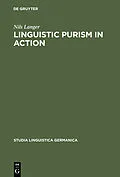The auxiliary do (tun) is one of the most-discussed constructions in West Germanic. In German, there is a striking opposition between modern standard German, where the construction is virtually ungrammatical and considered to be "sub-standard" by most speakers, whilst, as this book shows, the construction is attested in all modern dialects as well as historic stages since 1350. In answering why auxiliary tun is ungrammatical in modern standard German, it is shown that the stigmatization of tun was caused by prescriptive grammarians in the 16th-18th century. Furthermore it is shown that the stigmatization of tun as "bad" German occurred in clearly discernible stages, from bad poetry (1550-1680), to bad written German (1680-1740) and finally to "bad" German in general (after 1740), thus providing evidence that the history of the standardization of German needs to take into account direct metalinguistic comments from prescriptive grammarians. The effectiveness of linguistic purism is also shown by evidence from two other constructions, namely polynegation and double perfect.
Autorentext
Der Autor hat an der Universität Newcastle upon Tyne promoviert und ist jetzt Dozent für Germanistik an der Universität zu Bristol.
